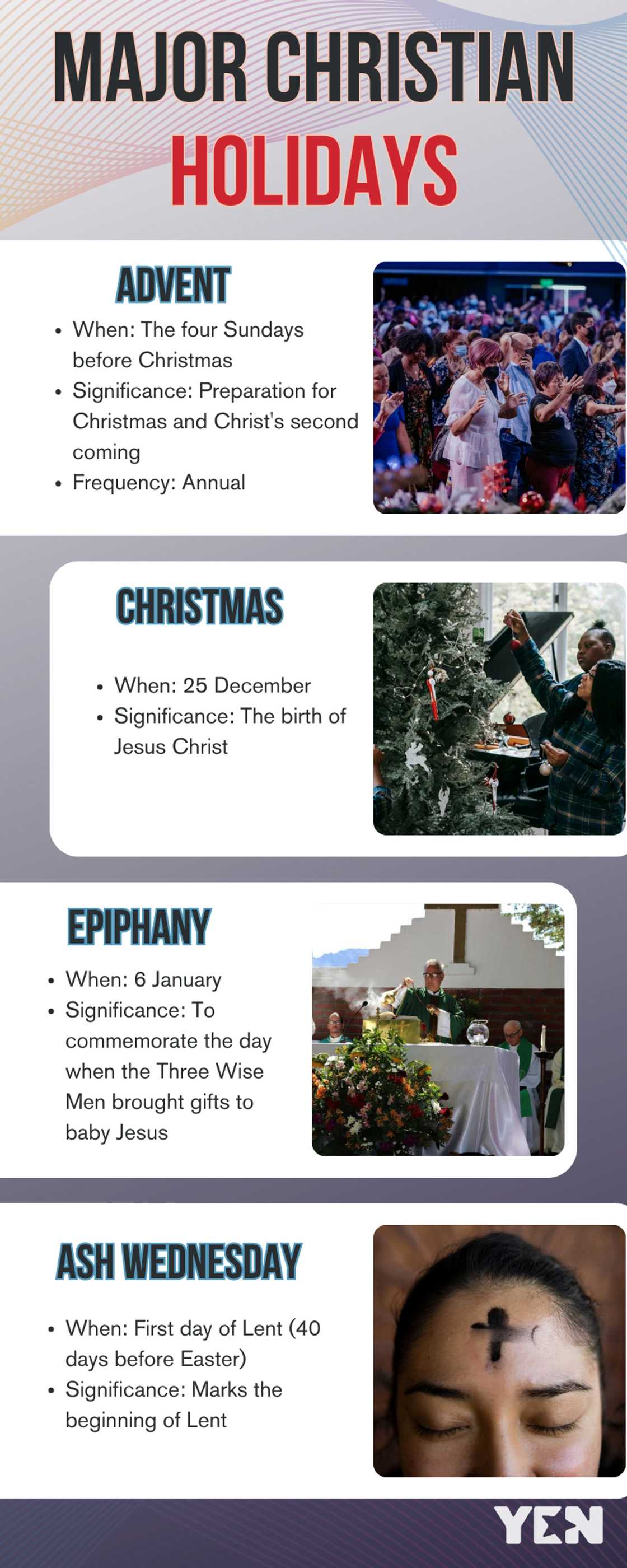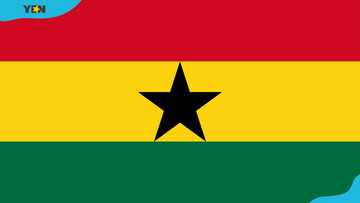A list of all Christian holidays: All the major Christian holidays in order
Throughout the year, Christians commemorate holidays crucial to their religion, such as Jesus Christ's birth, critical moments in his life and teachings, and significant days in Church history. Explore the major Christian holidays chronologically, explaining their significance, when they are observed, and how believers worldwide celebrate them.

Source: UGC
TABLE OF CONTENTS
Christian holidays can be divided into feast days and fast days. It all depends on the focus of the specific holiday. Feast days are elaborate celebrations in which Christians commemorate joyous events such as the birth of Christ. On the other hand, fast days are religious festivals that emphasise self-reflection and repentance.
List of all major Christian holidays
There are many Christian holidays, some more well-known than others. Here is a list of all major Christian holidays in order of celebration from Advent to All Saints Day.
No | Holiday | Time of occurrence |
1 | Advent | The four Sundays before Christmas |
2 | Christmas | 25 December |
3 | Epiphany | 6 January |
4 | Ash Wednesday | First day of Lent (40 days before Easter) |
5 | Lent | 40 days before Easter |
6 | Palm Sunday | Sunday before Easter |
7 | Maundy Thursday | Thursday before Easter |
8 | Good Friday | Friday before Easter |
9 | Easter | The first Sunday after the first full moon after 21 March |
10 | Ascension Day | 40 days after Easter Sunday |
11 | Pentecost | 50 days after Easter Sunday |
12 | All Saint's Day | 1 November |
1. Advent

Source: UGC
- When: The four Sundays before Christmas
- Significance: Preparation for Christmas and Christ's second coming
- Frequency: Annual
What holidays do Christians celebrate? Advent marks the start of the Christian liturgical year, which includes the four Sundays leading up to Christmas.
It is a time of spiritual preparation and expectancy for Christ's return, both in commemorating his birth and anticipating his second coming. Traditions include lighting Advent candles, wreath-making, and reflecting on love, peace, joy, and hope.
2. Christmas

Source: UGC
- When: 25 December
- Significance: The birth of Jesus Christ
Christmas, which celebrates the birth of Jesus Christ, is one of the most popular Christian holidays. It is a season of joy, sharing, and kindness, with traditions that vary by culture but often include church services, gift-giving, nativity scenes, festive meals, and singing carols. The day is significant because it marks God's incarnation in human form, as predicted in the Bible.
3. Epiphany

Source: UGC
- When: 6 January
- Significance: To commemorate the day when the Three Wise Men brought gifts to baby Jesus
Epiphany is a Christian holiday commemorating the day the three Kings, also known as the Three Wise Men, arrived in Bethlehem to present gifts to the newborn Jesus. It is also a time for Christians to reflect on the actual meaning of Christmas.
Epiphany signals the end of the festive season and the start of Lent preparations. Epiphany is one of the most important Christian festivals in nations with a strong Catholic tradition, such as Mexico and Spain.
4. Ash Wednesday

Source: UGC
- When: First day of Lent (40 days before Easter)
- Significance: Marks the beginning of Lent
Ash Wednesday marks the start of Lent, a season of repentance, fasting, and preparation for Easter. Observers may attend church services where ashes are applied to the forehead as a cross, representing penance and mortality.
The ashes are frequently made by burning the palm branches blessed on the previous year's Palm Sunday.
5. Lent

Source: UGC
- When: 40 days before Easter
- Significance: Repentance and reflection of the death, burial, crucifixion, and resurrection of Christ
Lent is one of the major holidays of Christianity. It is a 40-day period of fasting, prayer, and penance that leads up to Easter Sunday. It starts on Ash Wednesday and ends on Holy Saturday, excluding Sundays.
During Lent, Christians reflect on Jesus Christ's sacrifice and spiritually prepare for Easter by fasting from particular foods such as meat and desserts, attending religious services, and engaging in acts of charity.
6. Palm Sunday
- When: Sunday before Easter
- Significance: Commemorating the entry of Jesus into Jerusalem
Palm Sunday marks Jesus' triumphant entry into Jerusalem, where multitudes greeted him with palm branches and laid them before him as he rode in on a donkey.
This holiday marks the start of Holy Week. It is commemorated with special church services, including reading the Gospel accounts of Jesus' entry into Jerusalem and blessing palm branches.
7. Maundy Thursday

Source: UGC
- When: Thursday before Easter
- Significance: Commemorating the Last Supper
Maundy Thursday, also known as Holy Thursday, commemorates the Last Supper when Jesus shared the final meal with his disciples before being crucified.
Christians celebrate this day by performing the Eucharist or Communion ritual, reenacting Jesus' act of washing his disciples' feet, and attending special church services that emphasise themes of self-sacrifice, humility, and service.
8. Good Friday

Source: UGC
- When: Friday before Easter
- Significance: Crucifixion of Jesus Christ
What is the holiday before Easter? Good Friday is the Christian holiday on the Friday before Easter Sunday.
Good Friday is the solemn observance of Jesus' crucifixion and death on the cross. It is a day of fasting, prayer, and reflection as Christians contemplate the significance of Christ's sacrifice to redeem humanity's sins. Services on Good Friday often include prayers, hymns, readings of the Passion narrative, and veneration of the cross.
9. Easter

Source: UGC
- When: First Sunday after the first full moon after 21 March
- Significance: Resurrection of Jesus Christ
What is the key holiday of Christianity? Easter is one of the most important Christian holidays when believers celebrate Jesus Christ's resurrection from the dead.
It is observed on the first Sunday following the full moon after the spring equinox, which usually occurs between late March and late April. Easter Sunday is a joyous celebration that includes church services, celebratory gatherings, Easter egg hunts, and food sharing with friends and family.
10. Ascension Day

Source: UGC
- When: 40 days after Easter Sunday
- Significance: Commemoration of the Ascension of Jesus Christ into heaven
Ascension Day commemorates Jesus' ascension into heaven 40 days after his resurrection. It is observed in church services, which include reading relevant scriptures and the recital of creeds professing faith in the ascended Christ.
11. Pentecost

Source: UGC
- When: 50 days after Easter Sunday
- Significance: Coming of the Holy Spirit
Pentecost, also known as Whitsunday, commemorates the day when the Holy Spirit descended on the believers and the founding of the Christian Church.
It is celebrated 50 days after Easter Sunday with special church services, such as hymn singing, reading the account of Pentecost from the Book of Acts, and prayers for the outpouring of the Holy Spirit.
12. All Saint's Day

Source: UGC
- When: 1 November
- Significance: Honouring all the saints
All Saints' Day commemorates all unknown and known saints who led exemplary lives of faith and devotion to God. It is honoured on 1 November by Catholics, with church services commemorating the saints' contributions to the Christian belief and reflecting on the hope of eternal life.
How does Christianity celebrate important days?
Christianity commemorates significant days or periods with traditions, rituals, and ceremonies tailored to each holiday's significance.
These events include church services, scripture readings, prayer, hymns, and communal gatherings. Many Christians also engage in acts of charity, reflection, fasting, or feasting to mark and honour these significant days.
What is the purpose of religious holidays?
Religious holidays in Christianity are intended to commemorate and celebrate significant events in Jesus Christ's life and the history of the faith.
These holidays serve as spiritual reminders, reinforcing core beliefs and values, creating a sense of community among believers, and offering opportunities for worship and reflection. They also provide opportunities for believers to deepen their understanding of their faith and build their relationship with God.

Source: Original
Christian holidays are rooted in the life, death, and resurrection of Jesus Christ and the teachings of the early Church. These festivals serve as reminders of God's love, mercy, and presence in the world. As a believer, observing these days is essential.
Yen.com.gh recently published an article on the best movies to watch on Good Friday with family and friends. Good Friday is the last Friday before Easter, commemorating the death of Jesus Christ.
The Passion of the Christ, The Greatest Story Ever Told, Kings of Kings, and Risen are some of the best Christian movies to watch with family and friends on Good Friday. Discover more movies on Netflix, Amazon Prime Video, Hulu, and Disney + relevant to Good Friday and Easter.
Source: YEN.com.gh








